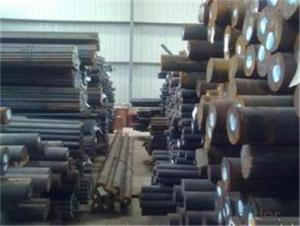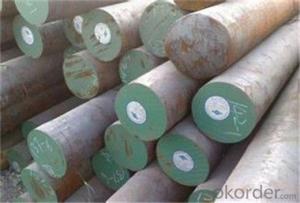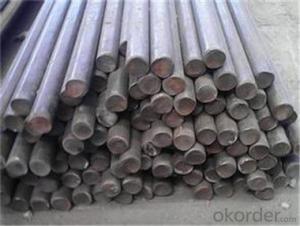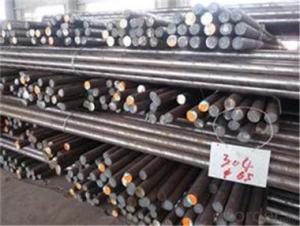42CrMO SCM440 Forged or Hot Rolled Sae 4140 Steel Round Bars
- Loading Port:
- Tianjin
- Payment Terms:
- TT OR LC
- Min Order Qty:
- 70 m.t.
- Supply Capability:
- 2000000 m.t./month
OKorder Service Pledge
OKorder Financial Service
You Might Also Like
Description of steel round bar:
Mild Steel Round Bar is used for making security grills, screens, Construction and Machine Manufacture.Stainless steel bar is widely used in Architecture,Machine Manufacture,Power Station,Electric Equipment and Factory,Oil and Chemical Industry,Food and Medical Industry,City Decoration Industry
Festures of steel round bar:
Length: standard 6m,9m,12m, or as customers' requirement
Surface: Black, polished, grinded, ,Bright, Turn smooth(Peeled),Brush,Mill,Pickled
Process:Hot rolled,cold drawn,forged
Packing: In bundle, tied by steel straps, covered with protecting film
Use wooden box, fill with foam to keep the surface from damaging
Specifications of steel round bar:
Description : Steel Bar/Stainless Steel Round Bar/Alloy Steel Round Bar/Carbon Steel Bar
Stainless Steel Bright Bar/Stainless Steel Peeled Bar/Stainless Steel Polishing Bar
Diamater:
1 Hot rolled round bar diameter from 5.5mm to 110mm
2.Hot forged round bar diameter from 110mm to 400mm
3.Cold drawn round bar diameter from 2.0mm to 60mm
4.Grinding bar diameter from 4.0mm to 40mm
5.Turn smooth diameter from 40mm to 250mm
Images of steel round bar:
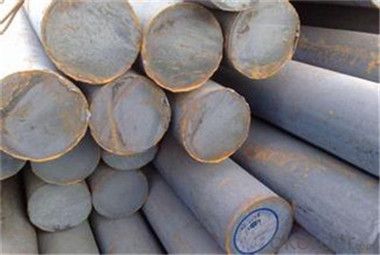
FAQ:
1. What is your main market?
We mainly export to Asia such as Japan,Korea,Thailand and North America and Middle East.
2. How long is the lead time?
Delivery time: 45 days after order confirmed.
3. What payment term do you accept?
Payment: T/T or L/C at sight.
4.Why do you choose to cooperate with us?
We have over10 years experience in this business so we are able to provide you the high quality products with the best price.
- Q:How are steel round bars used in the manufacturing of hydraulic systems?
- Due to their strength, durability, and versatility, steel round bars are widely used in the manufacturing of hydraulic systems. These bars serve multiple purposes in the construction and assembly of hydraulic components. One primary application of steel round bars in hydraulic systems is for fabricating piston rods. Piston rods are crucial components of hydraulic cylinders that transfer the force generated by the hydraulic fluid to the desired mechanism. The high strength and rigidity of steel round bars make them ideal for this purpose, as they can withstand the intense pressure and stress exerted on the piston rod during operation. Steel round bars are also utilized in manufacturing shafts and axles within hydraulic systems. These components transmit rotational motion and torque from the hydraulic pump to other mechanical parts, such as gears or pulleys. By using steel round bars, manufacturers can ensure the reliability and longevity of these critical parts, as they possess excellent mechanical properties and resistance to wear and tear. Moreover, steel round bars are often employed in constructing hydraulic fittings and connectors. These components join different hydraulic pipes, hoses, or valves together, creating a sealed system for fluid transmission. Steel round bars provide the necessary strength and stability to withstand the high-pressure conditions within hydraulic systems, ensuring leak-free operation and efficient fluid transfer. In conclusion, steel round bars play a vital role in the manufacturing of hydraulic systems by providing strength, durability, and versatility. Their use in piston rods, shafts, axles, fittings, and connectors ensures the proper functioning and reliability of these systems.
- Q:How do steel round bars perform under bending or flexing forces?
- Steel round bars are highly resistant to bending or flexing forces due to their strong and rigid nature. They can withstand significant loads without deforming or breaking, making them ideal for applications that require structural integrity and durability.
- Q:Are steel round bars suitable for structural applications?
- Yes, steel round bars are suitable for structural applications. They are commonly used in construction, engineering, and manufacturing industries for various structural purposes due to their high strength, durability, and versatility. Steel round bars provide excellent support and reinforcement in buildings, bridges, machinery, and other structural components.
- Q:What are the different standards for steel round bars?
- Steel round bars have different standards depending on the country and industry. Various commonly used standards are as follows: 1. In the United States, ASTM A36 is widely used. It specifies the requirements for carbon structural steel, including round bars. The standard covers the steel's chemical composition, mechanical properties, and dimensional tolerances. 2. Many European countries use EN 10025, a European standard that encompasses structural steel, including round bars. It defines the steel's chemical composition, mechanical properties, and technical delivery conditions. 3. In Asia, JIS G3101 is commonly used. This Japanese standard specifies the general requirements for hot-rolled steel, including round bars. It covers the steel's chemical composition, mechanical properties, and dimensional tolerances. 4. Germany and other European countries commonly employ DIN 17100. This German standard defines general structural steels, including round bars, and provides detailed information on the steel's chemical composition, mechanical properties, and technical delivery conditions. 5. The British standard, BS 970, covers various types of steel, including round bars. It provides specifications for the steel's chemical composition, mechanical properties, and dimensional tolerances. These examples represent only a fraction of the numerous standards for steel round bars. To ensure the desired properties and quality of the steel, it is crucial to consult the appropriate standard for specific applications.
- Q:What are the different types of steel round bar surface treatments used in the automotive industry?
- In order to enhance the performance, durability, and aesthetics of components in the automotive industry, various surface treatments are utilized for steel round bars. Some commonly employed treatments include: 1. Phosphating: Widely used, this treatment involves the application of a phosphate coating onto the steel round bar. Its purpose is to improve corrosion resistance and establish a suitable foundation for further coatings or paints. 2. Galvanizing: Another method is to apply a layer of zinc onto the surface of the steel round bar. This treatment offers excellent corrosion resistance and extends the lifespan of the component. 3. Electroplating: By utilizing an electric current, a thin layer of metal, such as chrome or nickel, is deposited onto the steel round bar's surface. This treatment enhances appearance, provides corrosion resistance, and improves wear resistance. 4. Powder coating: A popular technique involves the application of a dry powder onto the surface of the steel round bar, followed by heating to form a protective coating. This treatment ensures exceptional durability, corrosion resistance, and can be customized with different colors and finishes. 5. Anodizing: Typically used for aluminum components, anodizing can also be applied to steel round bars in specific cases. This treatment involves the creation of an oxide layer on the surface, resulting in improved corrosion resistance and enhanced appearance. 6. Black oxide coating: A chemical treatment that produces a blackened surface on the steel round bar. This treatment offers corrosion resistance, improved aesthetics, and can serve as a lubricant in certain applications. It is crucial to consider the specific requirements of the automotive component, including environmental conditions, desired appearance, and functional properties when selecting the appropriate surface treatment. Manufacturers meticulously choose the most suitable treatment to ensure optimal performance and longevity of steel round bars in the automotive industry.
- Q:What is the maximum load capacity of a steel round bar?
- Various factors, including the diameter, length, and grade of the steel, influence the maximum load capacity of a steel round bar. Steel round bars are engineered to endure different levels of stress, resulting in varying load capacities. Generally, the yield strength and ultimate tensile strength of the steel determine the load capacity. To ascertain the maximum load capacity of a particular steel round bar, it is imperative to refer to engineering specifications or manufacturer-provided reference materials. These specifications will furnish the necessary data to compute the load capacity based on the precise dimensions and characteristics of the round bar. It is crucial to emphasize that load capacity calculations should be entrusted to qualified professionals who possess a comprehensive comprehension of structural engineering principles and material properties.
- Q:Can steel round bars be used in the oil and gas industry?
- Yes, steel round bars can be used in the oil and gas industry. Steel round bars are commonly used in various applications within the industry, including drilling, production, and transportation of oil and gas. These bars are highly durable and offer high strength, making them suitable for withstanding the harsh and demanding conditions that are typically found in the oil and gas sector. They are used in the construction of drilling equipment, such as drill collars and drill pipes, as well as in the production of valves, pumps, and other critical components. Additionally, steel round bars are used in the fabrication of pipelines and offshore platforms, where they provide structural support and ensure the integrity of the infrastructure. Overall, steel round bars are essential materials in the oil and gas industry due to their strength, reliability, and ability to withstand the challenging environments encountered in this sector.
- Q:Can steel round bars be used in the electronics industry?
- Although steel round bars are not commonly used in the electronics industry due to their limited applications and low electrical conductivity, they can still find some utility in this field. Instead of being utilized in electronic components or circuitry, materials with high electrical conductivity like copper or aluminum are typically preferred. These materials allow for efficient transmission of electrical signals and minimize losses. Nonetheless, steel round bars can serve various purposes in the electronics industry. They can be employed for structural functions, providing support or reinforcement to electronic equipment or enclosures. Additionally, they can be utilized in the manufacturing of different mechanical components, connectors, or fixtures used in electronics assembly. Furthermore, steel round bars can be applied in the construction of equipment racks, shelves, or storage systems for electronic devices. In summary, although steel round bars are not directly involved in the electrical aspects of the electronics industry, they still play crucial roles in terms of structural support and mechanical components.
- Q:Can steel round bars be used in corrosive environments?
- The suitability of steel round bars in corrosive environments depends on the specific type of steel and the severity of the corrosion. For instance, stainless steel round bars are well-known for their excellent resistance to corrosion and are widely used in corrosive environments like marine applications, chemical processing plants, and wastewater treatment facilities. These bars are typically alloyed with elements such as chromium and nickel, which create a protective layer on the surface of the steel, preventing corrosion. On the other hand, carbon steel round bars are more susceptible to corrosion and may not be appropriate for highly corrosive environments unless they are properly coated or treated. In such situations, it is crucial to seek advice from experts or engineers to select the right steel grade and take necessary precautions to ensure the durability and performance of steel round bars in corrosive environments.
- Q:Can steel round bars be anodized?
- Steel round bars cannot be anodized as anodizing is exclusively tailored for aluminum and its alloys. This process entails generating an oxide layer on the metal's surface, offering improved corrosion resistance and decorative possibilities. In contrast, steel lacks the ability to form a stable oxide layer like aluminum, thus precluding anodization. Nevertheless, alternative surface treatment alternatives, such as galvanizing or powder coating, can be employed for steel, yielding comparable advantages.
1. Manufacturer Overview |
|
|---|---|
| Location | |
| Year Established | |
| Annual Output Value | |
| Main Markets | |
| Company Certifications | |
2. Manufacturer Certificates |
|
|---|---|
| a) Certification Name | |
| Range | |
| Reference | |
| Validity Period | |
3. Manufacturer Capability |
|
|---|---|
| a)Trade Capacity | |
| Nearest Port | |
| Export Percentage | |
| No.of Employees in Trade Department | |
| Language Spoken: | |
| b)Factory Information | |
| Factory Size: | |
| No. of Production Lines | |
| Contract Manufacturing | |
| Product Price Range | |
Send your message to us
42CrMO SCM440 Forged or Hot Rolled Sae 4140 Steel Round Bars
- Loading Port:
- Tianjin
- Payment Terms:
- TT OR LC
- Min Order Qty:
- 70 m.t.
- Supply Capability:
- 2000000 m.t./month
OKorder Service Pledge
OKorder Financial Service
Similar products
New products
Hot products
Related keywords
